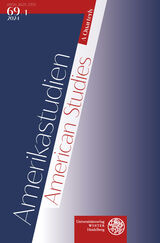Autor: Christa Buschendorf
- «
- 1
- »
Die Suche erzielte 4 Treffer.
Poet and Reader in the Witness Box Beitrag open-access
Society on Trial in Muriel Rukeyser’s Early Poetry
Mission Statement Editorial open-access
Reviews - Amerikastudien 59/3 (2014) Rezensionen open-access
- «
- 1
- »
